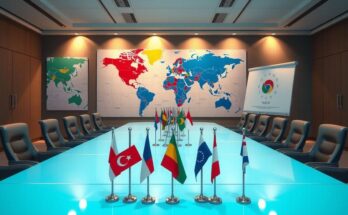On the 49th anniversary of Argentina’s coup d’état, tens of thousands marched to honor victims of state terrorism. United under “Memory, Truth and Justice,” groups opposed President Javier Milei’s government, which has been criticized for undermining human rights organizations. The Abuelas de Plaza de Mayo highlighted ongoing efforts to reunite families torn apart during the dictatorship. The demonstration, marked by peaceful remembrance and political expression, reflected the nation’s continued commitment to justice.
On the 49th anniversary of the coup d’état in Argentina, tens of thousands participated in a nationwide march to remember the victims of state terrorism during the 1976-1983 military dictatorship. The event, under the banner “Memory, Truth and Justice,” saw demonstrators carrying torches and photos of those who went missing during this dark chapter of history.
Marking the National Day of Memory for Truth and Justice, which is a public holiday, various human rights organizations, political parties, labor unions, social groups, and student movements united in Buenos Aires. The march concluded at the Plaza de Mayo, situated in front of the governmental house.
This year’s gathering was notably unified against President Javier Milei’s administration, with Argentina’s prominent human rights organizations participating together for the first time in almost twenty years, following a split in 2006. Veteran human rights activists, including Estela de Carlotto, Taty Almeida, and Adolfo Pérez Esquivel, read a consensus document in the final stages of the rally.
The march was prominently led by the Madres de Plaza de Mayo and the Abuelas de Plaza de Mayo, two organizations dedicated to exposing the plight of those who disappeared under the dictatorship. Owing to the political atmosphere under President Milei, who has been accused of undermining human rights bodies and challenging historical narratives, demonstrators expressed their stark opposition.
In a significant announcement, just hours before the march, the government declared its intention to declassify intelligence files on military actions during the dictatorship’s reign and transfer them to Argentina’s National Archives. Human rights organizations estimate that approximately 30,000 individuals were forcibly disappeared during that era.
The Abuelas de Plaza de Mayo remain vigilant in their search for children believed to have been taken from mothers during detentions. “In this long fight, we have resolved 139 cases” out of an estimated 350 to 400 stolen children, stated Carlotto. She emphasized, “We need all of society to find them all; it is never too late… the state must guarantee the restitution of our granddaughters and grandsons.”
Argentina’s dictatorship is regarded as one of the most oppressive among the series of military regimes across Latin America from the 1960s to the 1980s. However, President Milei has questioned the number of disappeared individuals, escalating tensions amongst the protestors.
Many demonstrators expressed their disdain for Milei’s policies, which have included austerity measures leading to job cuts in human rights entities. Shouts of “Milei, garbage, you are the dictatorship” echoed throughout the march as participants waved Argentine flags and wore scarves inscribed with “Nunca más” (“Never again”). Fortunately, the demonstration proceeded peacefully despite previous violent interactions at other protests.
María Eva Gómez, a participant, remarked, “Today I feel that we must be here more than ever to ensure we do not lose the memory of the horror Argentina lived through.” She reflected on the importance of preserving democracy while acknowledging its costs in innocent blood, affirming that remembrance is crucial.
The massive demonstration in Argentina on the 49th anniversary of the coup highlighted the ongoing struggle for truth and justice regarding the victims of the military dictatorship. The event was characterized by unity among diverse groups opposing the current government’s stance on human rights, emphasizing the importance of remembrance in maintaining democracy. Calls for accountability and restitution for the disappeared children underscored the emotional and political weight of the march, marking it as a continuation of the fight against state terrorism.
Original Source: www.batimes.com.ar




